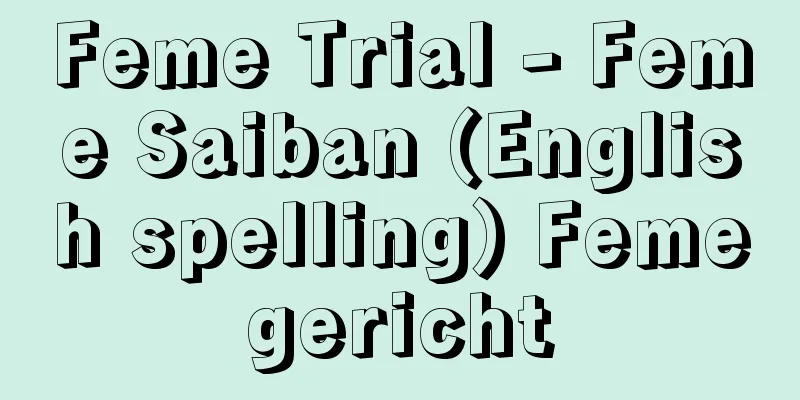Chu Ci - Soji

|
The name of a book that collected the 'Shufu' (compositions) written by Qu Yuan of the state of Chu (Hubei and Hunan regions) towards the end of the Warring States period in China, as well as works by his disciples and successors in the same style. It is also the name of the style of writing. The 25 Chu Ci (compositions) written by Qu Yuan are also collectively called the 'Li Sao'. Qu Yuan (around the 3rd century BC), a member of the Chu royal family, was rejected due to slander from his colleagues. Feeling sad and resentful, he composed the fu "Li Sao" in which he called on King Huai to repent, but his work was not used. Unable to bear seeing his country destroyed, he is said to have finally thrown himself to his death in Miluo (the pool of the Xiang River which flows into Lake Dongting). Later generations mourned and lamented the memory of Qu Yuan, and studied his style to compose their own fu. Liu Xiang of the Han dynasty compiled 16 volumes of the Chu Ci, adding one of his own to the works of Qu Yuan and later authors. Wang Yi of the Later Han dynasty edited and annotated the fu and wrote 16 volumes of the Chu Ci Zhangju. The extant works are collectively called the "Li Sao" and consist of 7 volumes and 25 chapters by Qu Yuan, including the "Li Sao Jing," "Nine Songs," "Questions of Heaven," "Nine Chapters," "Voyage to Heaven," "Bu Jing," and "Fisherman." There are also the "Nine Explanatory Notes" and "Shou Kon" by his disciple Song Yu, the "Great Exhortation" by Jing Sa (or Qu Yuan), and the "Great Exhortation" by Jia Yi of the Han dynasty. The Chu Ci are made up of 10 volumes: "Sekisei" by Wang Zheng, "Shouyinshi" by Huainan Xiaoshan, "Seven Admonitions" by Dongfang Shuo, "Ajimei" by Yanji, "Nine Hui" by Wang Bao, "Nine Lamentations" by Liu Xiang, and "Nine Thoughts" by Wang Yi, making a total of 17 volumes. Hong Xingzu of the Song Dynasty created the 17-volume "Supplementary Commentaries to the Chu Ci" on this work. Zhu Xi (Zhu Xi) composed 8 volumes of the Collected Commentaries on the Chuci, calling Qu Yuanfu "Li Sao" and the works from Song Yu down through "Zhao Yinshi" as "Zhou Li Sao." He also corrected the old annotations and composed 2 volumes of the Dialectical Commentaries on the Chuci. He also edited Chao Buzhi's Continued Chuci and Bian Chuci, and composed 6 volumes of the Postword Commentaries on the Chuci, containing 52 pieces including "Becoming Acts" and "Pei Shi" by Xunqing of the Zhou dynasty, and "Gizhao" by Lü Dayin of the Song dynasty. Wang Yuan of the Ming Dynasty, Lin Yunming of the Qing Dynasty, and Jiang Ji of the Qing Dynasty recorded the Qu Yuan Fu and the "Zhao Soul" and "Da Zhao", so some books refer to only these as the Chu Ci. The so-called Qu Yuan Fu is as follows: (1) Li Sao The "Li Sao Jing" is an honorific. "Li" means "to be afflicted" and "Sao" means "to be troubled" and to be troubled. It is a long poem of 373 lines, a monologue by a nobleman of the same race as Chu, whose pen name was Lingjun and whose family name was Zhengzhong. Lingjun was innocent and pure, so he was not suited to the world. He was banished for a crime he did not commit and was filled with anguish and suffering. He soared through the sky, reached the ends of the earth, and sought acquaintances in the world of legends and myths, but to no avail. He tried to rise in the light of the heavens, but was drawn to the mountains and rivers of the Chu country and was saddened. Finally, he resolutely decided to leave for Peng Xian, whom he admired. The concept is grand, the words are graceful, and the tone is full of romantic sentiment. The intense emotions of worrying about his country and thinking about his king are a reflection of Qu Yuan himself, making this a masterpiece of classical poetry. (2) Nine Songs The eleven songs, Donghuang Taiyi (Heavenly Emperor), Yunzhongjun (Cloud God), Xiangjun and Xiangfujin (Two Gods of the Xiang River), Dasimei and Shaosimei (Two Gods of Fate), Dongjun (Sun God), Hebo (Yellow River God), Shangui (Female Mountain Spirit), Guoshang (Mourning the War Dead), and Lishun (Regular Rites), are nine types of ritual songs whose ancient lyrics are said to have been revised by Qu Yuan. They are excellent festival songs filled with mythological and religious feelings. (3) Questions from Heaven It is said that Qu Yuan expressed his anger and distress when questioned about the strange stories on the murals in the shrine. In these 375 verses, he appears to have expressed in the form of questions about the heavens, the earth, the universe, and many ancient legends. (4) Nine chapters: "Sighing," "Crossing the River," "Ai Ying," "Picking Up on Thought," "Hai Sha," "Remembering Beauty," "Regretting the Past," "Ode to Tachibana," and "A Sad Return." These nine chapters are said to describe Qu Yuan's sorrows as he was wandering. "Ode to Tachibana" was written in the earliest period. "Picking Up on Thought," "Regretting the Past," and "Sighing" were written around the same time as "Li Sao," during his wanderings during the reign of King Huai. "Sighing," "Crossing the River," "Ai Ying," "Hai Sha," and "Regretting the Past" were written in his later years after his exile during the reign of King Xiang. "Hai Sha," in particular, is said to be a death poem in which he throws himself into the water while holding a sandstone. (5) Traveling Far Away The words and phrases in the text are similar to those in the Li Sao text, but it also has the flavor of Taoism, so it was probably written by a later person. (6) Divination When Qu Yuan was unsure whether to curry favor with the common people or to live in solitude, he consulted a diviner. The diviner replied that he could not read the fortunes of a man of strong will like Qu Yuan. He should follow his own will. This too seems to have been written by a later author. (7) Fisherman Qu Yuan met an old fisherman near the edge of the Xiang River, who said, "The whole world is polluted, and I alone am pure. Everyone is drunk, and I alone am awake." The fisherman advised Qu Yuan to go with the flow, but Qu Yuan said that it would be better to drown himself in the dust of the world than to soil his innocent body with the dirt of the world. The fisherman laughed and sang, "When the water of the Canglang River is clear, I will wash my tassels with it. When the water of the Canglang River is polluted, I will wash my feet with it." He rowed away. This too was probably written by a later person, but it clearly shows Qu Yuan's character and is known as the "Fisherman's Speech." The Chuci originally developed from the prayers of the Shu (priests) of the Chu state and became a style of poetry, so it is rich in the romantic atmosphere of rituals and mythological traditions. This is a southern characteristic not seen in the northern Book of Songs. The romanticism of later Chinese literature is a tradition of the Chuci. The Chuci style has the auxiliary character "kei" in the middle or at the end of a line to set a tone. "Zhaokon" has the character "shi" at the end of the line, and "Dazhao" has the character "sa" at the end. Another distinctive feature is the short chapter "ran" at the end of a long piece, which summarizes the meaning of the piece. [Hoshikawa Kiyotaka] "Fujino Iwatomo, 'Chinese Poetry Series 3: Chu Ci' (1967, Shueisha)" ▽ "Hoshikawa Kiyotaka, 'Study of the Chu Ci' (1961, Youtokusha)" ▽ "Hoshikawa Kiyotaka, 'New Interpretation of the Chinese Classics Series 34: Chu Ci' (1970, Meijishoin)" ▽ "Hoshikawa Kiyotaka, 'New Book of Chinese Classics: Chu Ci' (1970, Meitoku Publishing)" Source: Shogakukan Encyclopedia Nipponica About Encyclopedia Nipponica Information | Legend |
|
中国の戦国時代の末ごろ、楚(そ)国(湖北・湖南地方)の屈原(くつげん)のつくった詞賦(しふ)(うた)と、同じ作風の弟子や後人の作とを集めた書物の名。またその文体の称。屈原の楚辞25編を「離騒(りそう)」とも総称する。 楚の王族屈原(前3世紀ころ)は同僚の讒言(ざんげん)によって退けられ、憂愁怨思(えんし)して「離騒」の賦をつくり、懐王の反省を求めたが用いられず、国の滅びるのをみるに忍びず、ついに汨羅(べきら)(洞庭湖(どうていこ)に注ぐ湘水(しょうすい)の淵(ふち))に投死したと伝えられる。後人は屈原を追慕哀惜して、その作風を学んで賦をつくった。漢の劉向(りゅうきょう)は屈原および後人の作に、自作1編を加えて『楚辞』16巻を編集した。後(ご)漢の王逸(おういつ)はその辞章を校定注釈して『楚辞章句』16巻を著した。現存の書は、屈原の「離騒経」「九歌(きゅうか)」「天問(てんもん)」「九章(きゅうしょう)」「遠遊(えんゆう)」「卜居(ぼくきょ)」「漁父(ぎょほ)」の7巻25編を「離騒」と総称し、弟子宋玉(そうぎょく)の「九弁(きゅうべん)」「招魂(しょうこん)」、同じく景瑳(けいさ)(あるいは屈原)の「大招(だいしょう)」、漢の賈誼(かぎ)の「惜誓(せきせい)」、淮南小山(わいなんしょうざん)の「招隠士(しょういんし)」、東方朔(とうぼうさく)の「七諫(しちかん)」、厳忌(げんき)の「哀時命(あいじめい)」、王褒(おうほう)の「九懐(きゅうかい)」、劉向の「九歎(きゅうたん)」に王逸の「九思(きゅうし)」を加えた10巻を「楚辞」と分類し、計17巻となっている。宋の洪興祖(こうこうそ)は本書について『楚辞補注』17巻をつくった。朱熹(しゅき)(朱子)は、屈原賦を「離騒」、宋玉以下「招隠士」までを「続離騒」として『楚辞集註(ちゅう)』8巻を著し、旧注を訂正して『楚辞弁証』2巻をつくり、晁補之(ちょうほし)の『続楚辞』『変楚辞』を削定して、周の荀卿(じゅんけい)の「成相(せいしょう)」「佹詩(きし)」以下、宋の呂大臨(りょたいりん)の「擬招」までの52編を『楚辞後語』6巻とした。明(みん)の汪瑗(おうえん)、清(しん)の林雲銘(りんうんめい)、蒋驥(しょうき)らは屈原賦と「招魂」「大招」とを伝述したので、それだけを『楚辞』とする本もある。いわゆる屈原賦は次のとおりである。 (1)離騒 「離騒経」は尊称である。「離」は「罹(り)(かかる)」、「騒」は「憂」、憂(うれ)いにかかるの意味である。楚と同族の正則、字(あざな)は霊均(れいきん)という貴公子の独白、373句の長編詩である。霊均は潔白純正なために世にあわず、無実の罪で追放されて憂悶(ゆうもん)苦悩し、天空を翔(か)けり、地の果てを極め、伝説神話の世界にまで知己を求めるが得られない。天光のなかを昇ろうとしても楚国の山河に心ひかれて悲しむが、ついに決然と敬慕する彭咸(ほうかん)のもとに去ろうという。構想は雄大、詞句は優美、浪漫(ろうまん)的な情調があふれ、国を憂え君を思う感情の激しさは、屈原自身を投影したもので、実に古典詩の傑作である。 (2)九歌 東皇太一(とうこうたいいち)(天帝)、雲中君(うんちゅうくん)(雲神)、湘君(しょうくん)・湘夫人(湘水の2神)、大司命(だいしめい)・少司命(しょうしめい)(運命の2神)、東君(とうくん)(日神)、河伯(かはく)(黄河の神)、山鬼(さんき)(女性の山霊)、国殤(こくしょう)(戦死者を悼む)、礼魂(通常の祭礼)の11編は9種の祭祀(さいし)歌で、屈原が古歌詞を修正したと伝える。神話的、宗教的な感情に満ちた、優れた祭りの歌である。 (3)天問 屈原が祠堂(しどう)の壁画の怪奇な物語を詰問して、憂憤の情を漏らしたと伝えるが、375句のなかに、天地宇宙や古代の多くの伝誦(でんしょう)を問いの形で述べたものとみられる。 (4)九章 惜誦(せきしょう)、渉江(しょうこう)、哀郢(あいえい)、抽思(ちゅうし)、懐沙(かいしゃ)、思美人(しびじん)、惜往日(せきおうじつ)、橘頌(きっしょう)、悲回風(ひかいふう)の9編は屈原が流離の憂悶を述べたものとされる。橘頌(たちばなのうた)はもっとも早い時代の作。抽思、悲回風、惜誦は離騒とほぼ同じころ、懐王の時代の流離の際に、また思美人、渉江、哀郢、懐沙、惜往日は頃襄(けいじょう)王のときの追放以後、晩年につくられたものであろう。ことに懐沙は砂石を抱いて投水する辞世の詞と伝えられる。 (5)遠遊 離騒と詞句内容も似ているが、神仙思想の色彩もあり、後人の作であろう。 (6)卜居 屈原が、俗人とともに君にこびるか、潔白を守り孤独に住むかに迷って、太卜(たいぼく)(占い)に問うが、卜者は、屈原のように志の固い人は卜(うらな)うことができない。自分の志を行うがよいと答える。これも後人の作のようである。 (7)漁父 屈原は湘水の淵のあたりで老漁夫に会い、「世を挙げて皆濁りて、我独り清(す)めり。衆人皆酔ひて、我独り醒(さ)めたり」という。漁夫は世とともに推移することを勧めるが、屈原は潔白の身を世の塵(ちり)に汚すよりは投死するほうがよいという。漁夫は笑って「滄浪(そうろう)(川の名)の水清(す)まば、以(もっ)て吾が纓(えい)(冠の紐(ひも))を濯(あら)うべし、滄浪の水濁らば、以て吾が足を濯うべし」と歌って漕(こ)ぎ去ったという。これも後人の作であろうが、屈原の性格を鮮明に物語るものであり、「漁父の辞」として知られる。 楚辞はもと楚国の祝(しゅく)(神官)の祝詞(のりと)の類から発展して、詩句の様式となったものであるから、その祭祀(さいし)や神話伝承のもつ浪漫的な情調が豊かである。これは北方の『詩経』にはみられない南方的特色である。後世の中国文学のもつ浪漫性は『楚辞』の伝統である。句中または句尾に「兮(けい)」という調子をとる助字があるのが「楚辞」の様式である。「招魂」は句末に「只(し)」、「大招」は「些(さ)」の字を置く。また長編の終章に一編の意をまとめた「乱」という短章があるのもその特色である。 [星川清孝] 『藤野岩友著『漢詩大系3 楚辞』(1967・集英社)』▽『星川清孝著『楚辞の研究』(1961・養徳社)』▽『星川清孝著『新釈漢文大系34 楚辞』(1970・明治書院)』▽『星川清孝著『中国古典新書 楚辞』(1970・明徳出版社)』 出典 小学館 日本大百科全書(ニッポニカ)日本大百科全書(ニッポニカ)について 情報 | 凡例 |
<<: Society [Islands] - Society
Recommend
Dialogues on the Italian Fathers - Dialogues on the Italian Faith
…Martin was followed by biographies by Sulpicius ...
Idas
...As for his father, it is said that he was eith...
Musa
Greek goddess of arts and learning. Plural Musai, ...
Magpie‐lark (Earth-nesting bird)
A species of bird in the family Grallina, a passer...
Wei-chang; Wei-ch`iang
In China's Qing dynasty, the term refers to of...
Epitonium scalare (English spelling) Epitoniumscalare
…About 100 species found in Japan. The giant clam...
Michael Baius
1513‐89 Flemish theologian. Also known as Bajus. H...
Long term memory
…The main causes of memory disorders that impair ...
Ikuta system - Ikuta system
This is the basic state system seen in Islamic dy...
Voyage - Koukai
〘 noun 〙 To cross the sea by boat. To navigate the...
Ewell
…a city in the southeast of England, Surrey. It m...
Awazu Offerings - Awazuku Gonin
〘Noun〙 The residents of Mikuriya, Awazu, Omi Provi...
Raimondi (English spelling) Ruggero Raimondi
Italian bass-baritone. Born in Bologna. Studied v...
Shirane Sanzan - Shirane Sanzan
Also written as Shiraneyama. A mountain range in t...
Koryo [town] - Koryo
An old town in Hikawa District, Shimane Prefecture...




![Karakalpakstan [Autonomous Republic] (English spelling)](/upload/images/67cb413cdd17e.webp)




